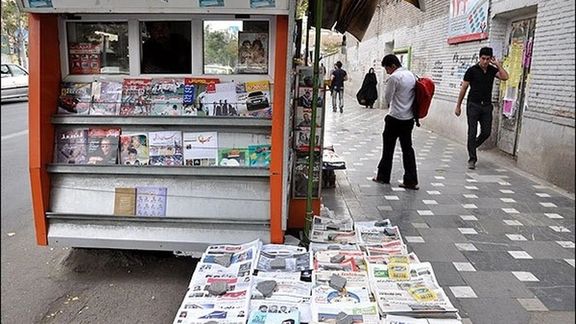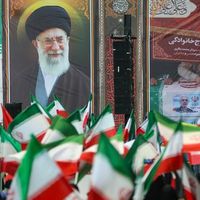“Some publications with a pro-Western history use ambiguous statements in an attempt to undermine [the importance of] the Zionist regime’s aggression and they call for restraint, that is, inaction and passivity,” the hardline Kayhan newspaper wrote Monday.
Kayhan, whose chief editor Hossein Shariatmadari is an appointee of Supreme Leader Ali Khamenei, is one of the top media arms of ultra-hardliners.
Kayhan singled out the reformist Sazandegi as a key offender in calling for "inaction," criticizing it for an article suggesting that Iran could refrain from a military response to Israel’s attack to avoid entangling the country in a cycle of retribution.
The same Sazandegi article had, nevertheless, suggested that the country should at the same time keep its military in a state of preparedness, help the establishment of a ceasefire in Lebanon and Gaza, and withdrawal of Israeli forces from these areas.
Another newspaper accused by Kayhan of fostering “inaction and passivity” was the reformist Shargh Daily for quoting former diplomat Hossein Mousavian as saying that based on what he called the “limited scope of Israel’s attack” and for the sake of security and stability in the region, the Islamic Republic should accept a ceasefire with Israel.
Mousavian had also said Tel Aviv, too, should stop its attacks on Lebanon and accept a ceasefire in Gaza, that Israel and Hamas should exchange prisoners, and that all sides involved in the conflict should work toward the two-state solution.
The IRGC-linked Javan newspaper and the ultra-hardline Vatan-e Emrouz echoed similar criticisms, accusing reformist outlets of failing to support calls for an immediate, forceful counterattack on Israel. While these reformist papers strongly condemned the Israeli attack on Iranian territory, they stopped short of endorsing aggressive retaliation and even advised caution against rash decisions.
These publications emphasized Supreme Leader Ali Khamenei’s Sunday remarks, cautioning against exaggerating or downplaying Israel’s attacks. In his speech, Khamenei delegated the decision on “how best to convey Iran's strength and resolve to the Zionist regime” to the “relevant authorities.”
In the same speech, Khamenei used a Quranic term (morjefun) to warn against “intentionally erroneous analyses” on social media and those who spread rumors that “harm the society’s psychological security” and called on authorities to take action against such moves. This was aimed both critics of the Islamic Republic, who argue that its military is useless, and possibly those calling for retaliation.
Referring to Khamenei’s remarks, Vatan-e Emrouz argued on Monday that authorities must set new rules for media activity “in accordance with the current circumstances". Such calls seem to have sparked serious concerns among other media who already have to be wary of the many “red lines” set for them.
“Some conservative media label any analysis they disagree with as evidence of acquiescence or normalization of the Zionist regime’s actions, and they call on the judiciary to take action against those responsible,” argued Rouydad24 in an article titled “Gray-Zone War and the Sensitive Circumstances of the Media” on Monday.
“One should hope that the media will not be the first victims of the gray zone war [between Iran and Israel] in the current circumstances with radicals labeling any realistic views as proof of rumor-mongering and frightening people. One should also hope that judicial and supervisory bodies do not come under the influence of radicals' propaganda and act according to laws and regulations,” Rouydad24 wrote.








